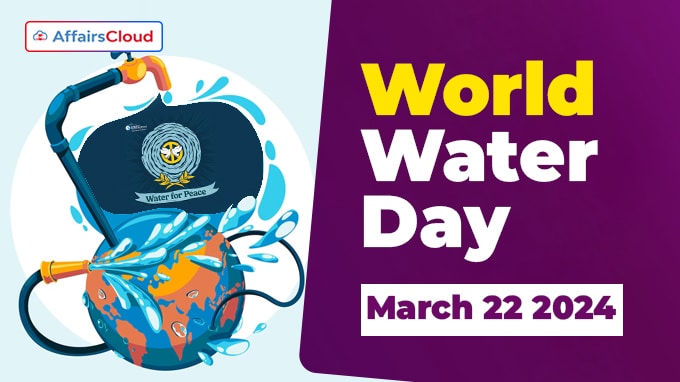 The United Nations (UN) World Water Day is annually observed across the globe on 22 March to celebrate water, promote action to tackle the global water and sanitation crisis and focus on the significance of freshwater.
The United Nations (UN) World Water Day is annually observed across the globe on 22 March to celebrate water, promote action to tackle the global water and sanitation crisis and focus on the significance of freshwater.
- The theme of UN’s World Water Day 2024 is “Water for Peace”/ “Leveraging Water for Peace.”
The annual observance of the day is led by the UN-Water and co-ordinated by UN Water members and partners and a dedicated task force in support of UN Member state and other stateholders.
Note: The 2024 task force is coordinated by the United Nations Economic Commission for Europe (UNECE) and the United Nations Educational, Scientific and Cultural Organization(UNESCO).
Significance:
i.The Day aims to raise awareness about the 2.2 billion people, who are currently living without safely managed drinking water services.
ii.The focus of World Water Day is to support the achievement of Sustainable Development Goal (SDG) 6: water and sanitation for all by 2030.
Background:
i.The idea of celebrating World Water Day was first proposed during the UN Conference on Environment and Development (UNCED) held in Rio De Janeiro, Brazil in 1992.
ii.In December 1992, the UN General Assembly (UNGA) adopted the resolution A/RES/47/193 and proclaimed the 22 March of every year as World Water Day.
iii.The 1st World Water Day was observed on 22 March 1993.
Global campaign on ‘Water for Peace’:
i.The global campaign of World Water Day 2024 on ‘Water for Peace’ focuses on the critical role water plays in the stability and prosperity of the world.
ii.It emphasises the vital role of water in human social systems and the significance of cross-border governance integration in the sustainable utilisation of water resources.
2024 Events:
i.The official celebrations of World Water Day 2024 took place at UNESCO headquarters in Paris, France.
ii.The central part of this celebration was the launch of the UN World Water Development Report (UN WWDR) 2024, titled “Water for Prosperity and Peace”.
- UN WWDR is the UN-Water’s flagship report on water and sanitation issues.
- The 2024 report is published by UNESCO on behalf of UN-Water and its production was coordinated by the UNESCO World Water Assessment Programme.
UN WWDR 2024:
i.The UN WWDR 2024, underscores escalating water-related conflicts worldwide and urges enhanced international cooperation and transboundary agreements to ensure peace.
- It emphasises water’s dual role in fostering peace or conflict. Sustainable water management is crucial for peace and prosperity worldwide.
Key Facts of the UN WWDR 2024:
i.2.2 billion people lack safely managed drinking water and 3.5 billion lack proper sanitation access.
ii.UN’s 2030 goal for universal access remains distant, with escalating inequalities.
iii.Water deficits contributed to 10% of the increase in global migration.
- Displacement can increase the burden on local water systems and resources, resulting in tensions between migrant and host communities.
Impact on Society and Gender Dynamics:
i.Water scarcity heightens food insecurity and health risks.
ii.Women and girls are disproportionately affected, facing increased burdens, that undermine women’s education, economic participation, and safety.
Water Scarcity and Migration:
i.Water scarcity drives migration, aggravating water insecurity and social tensions.
ii.Displacement leads to strain on resources and increased gender-based violence.
Importance of Transboundary Agreements:
i.Lack of transboundary agreements heightens conflict risks. Approximately 40% of the world’s population lives in transboundary river and lake basins.
ii.Only a fifth of countries have cross-border agreements to jointly manage shared resources equally.
iii.Over 3 billion people globally depend on water that crosses national borders.
iv.But, of 153 countries sharing transboundary rivers, lakes, and aquifers, only 32 have 90% or more of their transboundary waters covered by operational arrangements.
Vulnerability in the African Context:
i.Africa is particularly vulnerable, with 19 out of 22 states facing water scarcity. Two-thirds of Africa’s freshwater resources are transboundary.
ii.Of the 106 transboundary aquifers mapped in Africa, interstate cooperation has only been formalised in 7.




